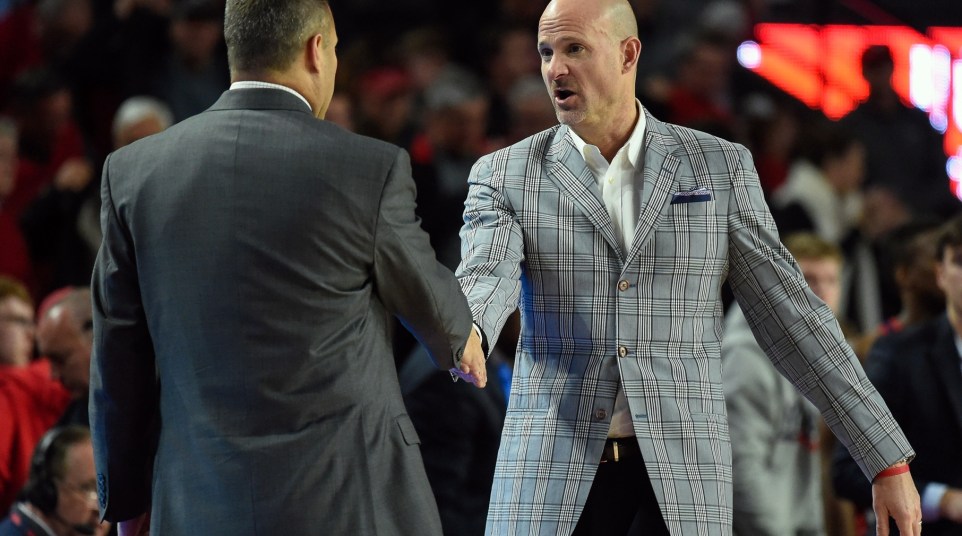
SEC coach firings show conference is taking more serious approach to basketball
Kentucky coach John Calipari was dumbfounded that Ole Miss fired Andy Kennedy. Well, at least it sounded like Calipari was dumbfounded.
You be the judge:
Calipari: "Everybody in this room will be dead before anyone wins more games at Ole Miss than Andy Kennedy."
— Dave Matter (@Dave_Matter) March 9, 2018
Calipari’s comment, while intentional or not, was a dig at Ole Miss. He was trying to say: “How could they fire a guy who won 245 games at a football school?” Never mind the fact that Kennedy made just 2 NCAA Tournament appearances in 12 years.
The day before that, ESPN college basketball analyst Sean Farnham went to bat for Georgia coach Mark Fox during the SEC Tournament by saying that he deserved to keep his job because Fox “squeezed everything he could” out of his roster. Never mind that in his ninth season, Fox’s roster was set to miss the NCAA Tournament for the seventh time.
Ultimately, both Fox and Kennedy were fired after long runs at their respective football-first schools. They were moves that were made strictly for on-the-court reasons.
The news of their firings didn’t hit me like they hit Calipari and Farnham. Instead, I viewed it as another sign that the SEC’s basketball perspective is changing. Suddenly, being a middle-of-the-pack Power 5 (or whatever they call it in basketball now) program is no longer acceptable.
How fitting that a change like that would take place in a year in which the SEC set a record for teams in the NCAA Tournament. That has to do with football-first schools like Auburn and Tennessee, which just completed remarkable, surprising seasons. Why? A few years ago, they both went out and hired premier head coaches.
That’s where the change has to take place. I’ve always believed that at places like Alabama, Auburn and Georgia, basketball coaches have much longer leashes because they aren’t the driving force behind their school’s revenue. Football is. That’s why guys who won like Mark Richt and Gus Malzahn still faced pressure that their school’s basketball coaches never did.
But why does it have to be one or the other? Why can’t the standard be raised at Georgia or Ole Miss?

Credit: Dale Zanine-USA TODAY Sports
Before they hired Tom Crean and Kermit Davis, both Georgia and Ole Miss went after former Ohio State coach Thad Matta. It was Matta who turned around the perception that OSU could only be a football school.
People might forget that Matta won 5 regular season B1G Championships and 4 B1G Tournament titles during his 13 years in Columbus. A pair of Final Four berths and an average of 26 wins per season made him an obvious candidate at a place like Georgia, Ole Miss or really anywhere with a vacancy.
Shortly after he took a pass on Ole Miss, Matta announced on Wednesday that he turned down Georgia (via Jeff Goodman):
Thad Matta on spurning Georgia: "It was the most difficult decision because Georgia is a tremendous opportunity for a coach to build a great program. Unfortunately, I just don’t feel that I am completely ready at this point to give Greg McGarity and Georgia what they deserve."
— Jeff Goodman (@GoodmanESPN) March 14, 2018
We don’t know what exactly held Matta back from accepting a reported $16 million deal. All we know was that at least it was offered. To me, that shows progress.
That shows that a program without rich history is willing to shake things up and make a big-time hire, even if it will never be the revenue-driver that Georgia football is.
That’s the case for most of the non-Kentucky schools in the SEC. But that doesn’t mean 9 years of mediocrity should be accepted just because. You can absolutely win big at a football school.
Besides Matta, others like Billy Donovan (Florida, back-to-back NCAA titles) and Rick Barnes (Texas) did it. Tennessee won a share of the regular season title with Barnes after it was picked to finish 13th in the conference. If the Vols return their starting lineup as expected, they’ll be penciled in as Kentucky’s top SEC competition next year after earning a share of the regular season title.
As I wrote before the SEC Tournament, the conference’s national reputation won’t really change until a few programs start competing with Kentucky on a yearly basis. Auburn and Tennessee reminded everyone why coaching was a quicker way for programs to do that than praying that a 5-star recruit came along.
The SEC has the “it all comes down to coaching” philosophy in football. Why not basketball, too?
Nobody is saying that Georgia or Ole Miss should start firing coaches who miss the NCAA Tournament in consecutive seasons. But the bar has certainly been raised.
Calipari might not have liked the fact that the longest-tenured member of the SEC coaching fraternity was fired. Or Calipari might not have liked the fact that Ole Miss fired the guy he went 10-1 against.
Either way, it’s clear. The standard for SEC basketball is changing.
Calipari and the rest of the college basketball world will just have to deal with it.
